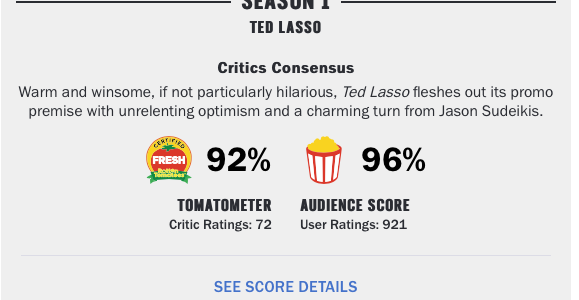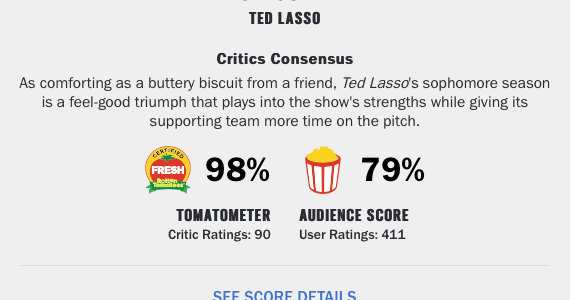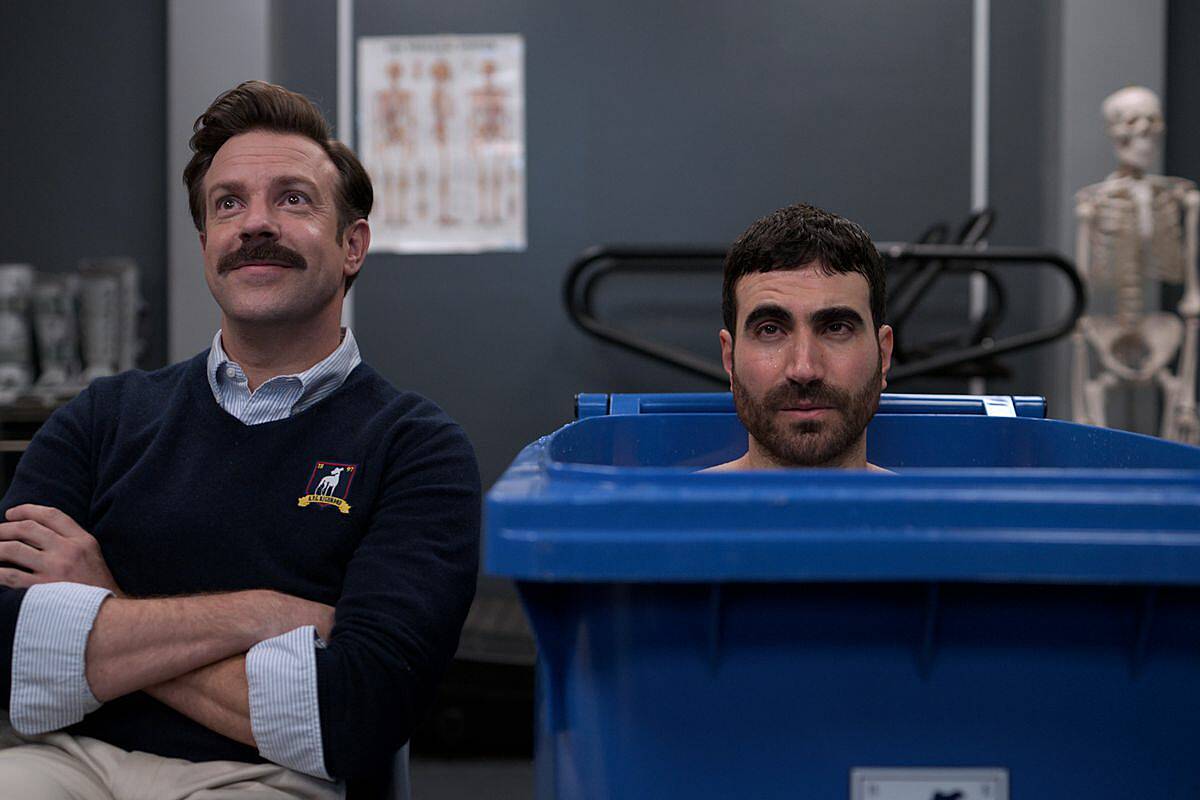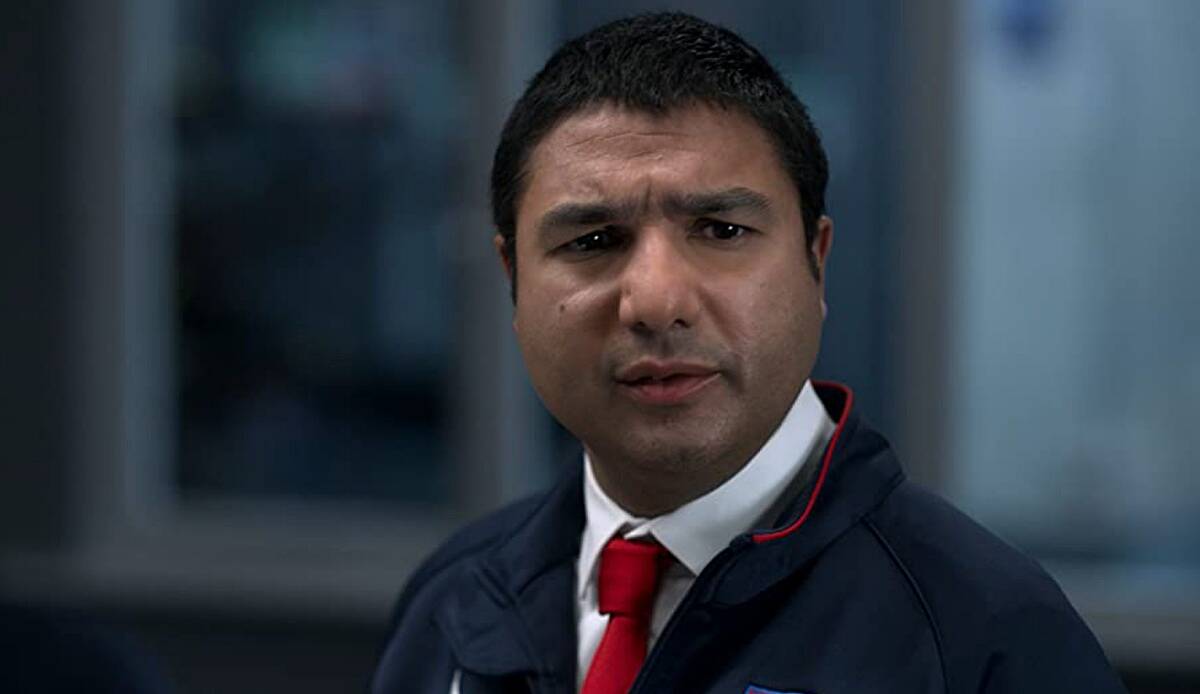If you haven't seen Ted Lasso yet, I envy you. You have a fantastic experience to look forward to. The premise is somewhat silly and simple (which makes sense because it's based on a series of commercials promoting Premier League Football in the United States). An American football coach becomes the coach for a British football (i.e. soccer) team.
I don't like the concept of "spoilers," plot is the least important part of good TV. But if you want to experience it in real time, I respect that. Don't read past this paragraph. And so you don't feel like you came here in vain, here's a great summation of all world philosophy.
Spoilers be yonder...
So why did Ted Lasso resonate with so many people? Aside from the many fish-out-of-water jokes (which are very good), the show's main character was a kind, empathetic, accommodating man. And there was no twist, he had no dark agenda. He was actually those things. The fact that it surprised the other characters on the show was a running bit. Everyone loved "Happy Ted."
"Happy Ted's" superpower was that his simple, positive energy complexified every character around him. Each character on the show starts out is a classic TV archetype:
- Roy is the grizzled veteran
- Keeley is the vapid girlfriend
- Jaime is the cocky, young talent
- Nate is the bumbling assistant
- Rebecca is the icy female boss
Through their interactions with Ted, we come to learn that these personas are not who they truly are, they're just masks they've created to hide their vulnerability.
Fun fact, the word "persona" comes from the Latin word for the mask that actors wore to amplify their voices (per- meaning "through" and -sona meaning "sound" like "sonic" or "sonar")
Fun fact, the word "persona" comes from the Latin word for the mask that actors wore to amplify their voices (per- meaning "through" and -sona meaning "sound" like "sonic" or "sonar")
- Roy is sensitive, but afraid of losing soccer, the thing he loves most in life
- Keeley is ambitious, but is worried no one will take her seriously because of her looks
- Jaime is kind, but seeks the approval of his father who emotionally terrorizes him
- Nate is smart and capable, but lacks confidence which causes him to stumble
- Rebecca is generous, but was betrayed by her ex-husband whom she genuinely loved
Not only do we learn about who these characters really are, but the characters themselves grow as well, dropping their masks and becoming more themselves.
Season 1 will always be "better"
After the first season, there was lot of hype about the second season, which inevitably means that people would be disappointed. There were lots of tweets about how the first was better. And the audience on Rotten Tomatoes seemed to agree with Twitter.
Season 1:
Season 2:
Season 1:

Season 2:

But I would argue that the second season is fantastic (before you consider that episode 9, Beard After Hours is one of the most satisfying bottle episodes I've ever seen).
In fact, I think the people who are upset that season two didn't contain more "Happy Ted" are missing (or ignoring) the central point of the entire second season. Which is that in season one, "Happy Ted" was coming from a place of a lot of pain and suppressed trauma.
Happy Ted is dead, long live Happy Ted
One of the reasons the first season resonated with so many people was its relentless positivity. I don't need to list all the terrible things happening in the world to describe how it feels to be constantly buried under many different, interlocking global crises. Pair that with the interpersonal crises that everyone experiences just by being alive on a planet with other people, and it easy to latch onto the "Happy Ted" lesson that the way forward is with optimism and seeing the best in other people. The tl;dr that people unconsciously took from season one was "If only more people just acted like Ted, the world would be a better place."
But season two indicates that hoping for a world of "Happy Teds" is a superficial reading. In fact, I'd argue that "acting like Ted" is what we've already been doing. We've been trying to act nice to each other, while pushing our feelings down, instead of actually dealing with our experiences and drawing strength from them. It's one of the reasons we're in the mess we're in (not the only reason, there are many).
In the second season, we see that Ted was masking real hurt from the suicide of his father. Instead of dealing with his feelings of betrayal and abandonment, he buried them and created a facade that projected positivity and acceptance towards others in order to prevent them from leaving him the way his father did.
Something undeniably good came out Ted's coping mechanism with this trauma - his attitude towards the world and his effect on others. But it also came at a cost, which reared its ugly head at the worst time, when Ted has a panic attack in the middle of a match. However, instead of suppressing it, Ted (with help) winds up acknowledging his past trauma and integrating what her learns into his understanding of the world.
Then in the climax of the second season, when an event happens that would have triggered his feelings of abandonment (Nate betraying his trust), he reacts differently. He’s able meet it with grace, seeing why Nate did what he did (notice how many times in the final episode Ted refer's to the plan as "Nate's false nine" in order to give him credit). Instead of feeling shame for having his vulnerability exposed to the world, he's able to do something very Ted-like that he wouldn't have been able to do before: transform it into putting something positive into the world (talking about mental health in sports).
The second season posits that just acting happy isn't enough to make the world a better place. While the process of understanding our past traumas can feel like we are losing who we are, integrating them actually makes us more ourselves. And becoming more ourselves is the path to transforming the world around us.
Oh Nate.
On the other hand, Nate's transformation is the perfect foil for Ted's. Nate is driven by the need to be recognized and respected. Ironically Ted gives him a taste of that feeling in season one. In a testament to the writing and Nick Mohammad's performance, without the audience really noticing, Nate undergoes a mini-Breaking Bad (see? Nate's right. no one pays attention to Nate). He gradually hardens his persona into the tough, smart leader he thinks he needs to project to get what he wants - the respect of others (stand-ins for his parents).
He pulls together what he sees being respected in others around him - Roy's toughness, Beard's steely wisdom, and Ted's ability to draw people's attention to himself - and dresses himself in a persona that's an amalgamation of those qualities. Only they're not him. They literally don't come from him.
And although this facade does serve him in some ways - Nate is a good tactician and the facade gives him the confidence to express his opinions - it also hinders him. He's so blinded by his need to be respected, that he doesn't see Ted actually giving him respect by crediting him for his "false nine." Nate perceives Ted as setting him up when the plan fails. Beneath the facade, Nate still doesn't believe in himself and his ideas.
I'm not one to predict what will happen in future episodes of a TV show (that's what the TV writers are for), but I'd imagine that Nate's newfound persona will work for him for while. He'll probably have a crisis moment when it suddenly stops working. The question is: will he use that crisis to grow or burrow further into his protective persona?
What's it all about?
The first season wasn't simply about "Happy Ted saves the team." It explored how people tend to cover their complex selves with simple personas and that simply seeing that they are often just defense mechanisms and not who people are can help them see themselves that way as well.
Likewise the second season wasn't simply about "Angry Nate ruins the team." It posited that happiness comes from deepening our relationship to our selves (traumas and all) and others, not from glossing over them with emphasis on some superficial mask (whether its ted’s goofy happy mask or nate’s tough genius mask)
I have no idea what the third season is about, I'm sure it'll be more interesting than Happy Ted vs. Angry Nate.

